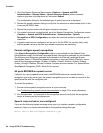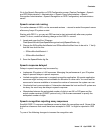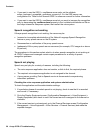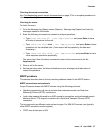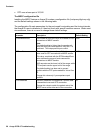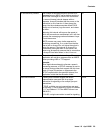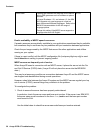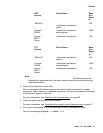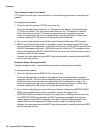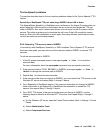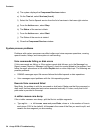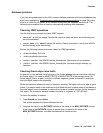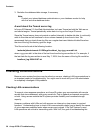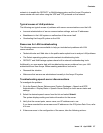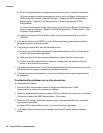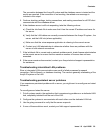Contents
32 Avaya IR R2.0 Troubleshooting
Text-to-Speech output is not heard
If TTS output does not play in an application, use the following procedure to investigate the
problem.
To investigate the problem:
1. Check for allocation errors (TTS008) in the error log.
This error indicates that a request for a TTS resource was denied, and the associated
TTS will not be heard. This error occurs when there are no TTS resources in service.
Either there are not enough TTS resources administered for the application or the
resource is temporarily out of service because the connection dropped. In either case,
consider adding more TTS ports on the Avaya Interactive Response.
2. Run a trace of the application and/or the Avaya Interactive Response VROP process.
3. MRCP errors (called status codes or completion causes) are logged in the VROP trace
and are reported to an application. At the highest trace level (5), the VROP trace will show
all MRCP messages exchanged. A SPEAK request will contain the TTS intended for play
and the corresponding SPEAK-COMPLETE from the server will contain the status code or
completion cause for that request.
Interpret the trace results using the MRCP specification and by consulting with the MRCP
server vendor as needed.
Automatic Speech Recognition fails
If speech recognition fails, use the following procedure to investigate the problem.
To investigate the problem:
1. Check for allocation errors (PROXY011) in the error log.
This error indicates that a request for a recognition resource was denied and speech
recognition will fail. This error occurs when there are no recognition resources in service.
Either there are not enough resources administered for the application in use or the
resource is temporarily out of service because the connection dropped. In either case,
consider adding more ASR ports on the Avaya Interactive Response.
2. Run a trace of the application and/or the Avaya Interactive Response ASRPROXYMGR.
MRCP errors (called status codes or completion causes) are logged in the
ASRPROXYMGR trace and are reported to an application. At the highest trace level (5),
the ASRPROXYMGR trace will show all MRCP messages exchanged. A recognition
request spans several MRCP messages, each with a corresponding response. If the
request fails, then the response will contain a status code or completion cause.
Interpret the trace results using the MRCP specification and by consulting with the MRCP
server vendor as needed.



